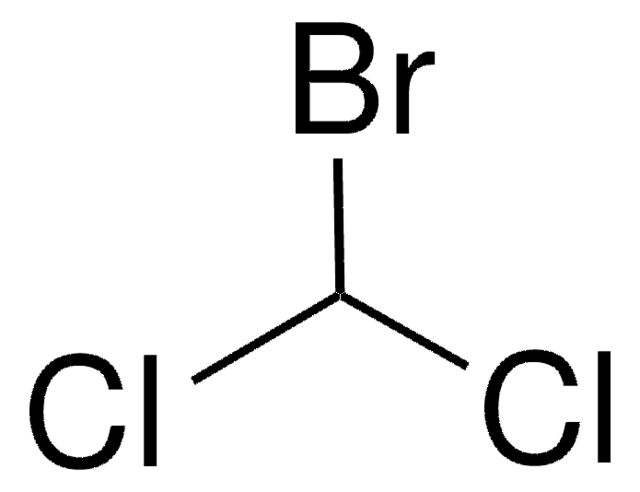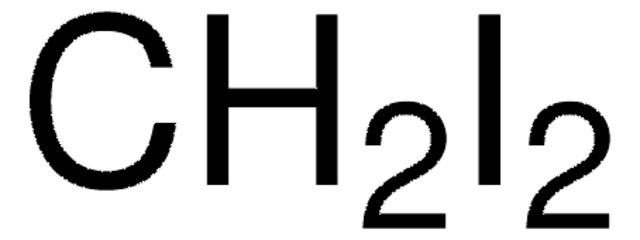206326
Dibromochloromethane
97%
Synonym(s):
Chlorodibromomethane
Sign Into View Organizational & Contract Pricing
All Photos(1)
About This Item
Linear Formula:
Br2CHCl
CAS Number:
Molecular Weight:
208.28
Beilstein:
1731046
EC Number:
MDL number:
UNSPSC Code:
12352100
PubChem Substance ID:
NACRES:
NA.22
Recommended Products
Quality Level
Assay
97%
form
liquid
refractive index
n20/D 1.547 (lit.)
bp
119-120 °C/748 mmHg (lit.)
mp
−22 °C (lit.)
solubility
acetone: soluble
diethyl ether: soluble
ethanol: soluble
density
2.451 g/mL at 25 °C (lit.)
functional group
bromo
chloro
storage temp.
2-8°C
SMILES string
ClC(Br)Br
InChI
1S/CHBr2Cl/c2-1(3)4/h1H
InChI key
GATVIKZLVQHOMN-UHFFFAOYSA-N
Looking for similar products? Visit Product Comparison Guide
Application
Affords bromochlorocarbene under phase-transfer conditions.
Signal Word
Warning
Hazard Statements
Hazard Classifications
Acute Tox. 4 Oral
Storage Class Code
10 - Combustible liquids
WGK
WGK 3
Flash Point(F)
Not applicable
Flash Point(C)
Not applicable
Personal Protective Equipment
dust mask type N95 (US), Eyeshields, Gloves
Choose from one of the most recent versions:
Already Own This Product?
Find documentation for the products that you have recently purchased in the Document Library.
Customers Also Viewed
Synthesis, 857-857 (1991)
Qiang Zeng et al.
Environment international, 54, 134-140 (2013-03-05)
Toxicological studies showed that trihalomethanes (THMs), the most abundant classes of disinfection by-products (DBPs) in drinking water, impaired male reproductive health, but epidemiological evidence is limited and inconsistent. This study aimed to examine the associations of baseline blood THMs with
S Landi et al.
Mutagenesis, 14(5), 479-482 (1999-09-03)
The brominated trihalomethanes (THMs) are mutagenic and carcinogenic disinfection by-products frequently found in chlorinated drinking water. They can be activated to mutagens by the product of the glutathione S-transferase-Theta (GSTT1++-1) gene in Salmonella RSJ100, which has been transfected with this
M N Kostopoulou et al.
Chemosphere, 40(5), 527-532 (2000-02-09)
An investigation into the occurrence of volatile organic compounds (VOCs) was conducted for a period of two years in the surface waters of Northern Greece. Samples from four rivers and five lakes were taken seasonally and analyzed for VOCs. The
M Luciene da Silva et al.
Toxicology letters, 106(1), 49-57 (1999-06-23)
Trihalomethanes (THMs; chloroform, bromoform, bromodichloromethane, dibromochloromethane), formed as by-products of chlorine disinfection, are found to occur in combination in drinking water supplies. THMs are metabolized by cytochromes P-450 and are likely substrates of CYP2E1. Therefore, it is possible that mixed
Our team of scientists has experience in all areas of research including Life Science, Material Science, Chemical Synthesis, Chromatography, Analytical and many others.
Contact Technical Service










